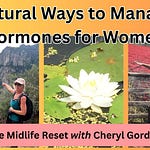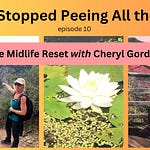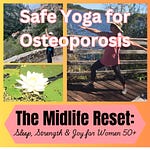Looking for some direction on how to begin your yoga journey? Click here for a FREE Essential Guide to Yoga for Women over 50.
Contact Heather through her website. Order the 100 Days of Care Workbook.
C: Welcome to episode number 12 of the Midlife Reset podcast. I am thrilled you're here. Today, you're going to meet a woman who is totally tuned into her heart vibration and made a wholesale shift midlife to follow her dream. So, please welcome Heather Fenton, from Gently Down the Stream Yoga, in beautiful lakeside, Port Colborne, Ontario. So, welcome Heather, tell us a little about yourself.
H: Hi Cheryl, that's a, that's a big open question to start with. I'm sitting here in uh, our studio space. I could start with that. Locate myself in space and time, so again, I'm happy to be here to chat with you.
C: Oh, wonderful. And Heather, the reason I really wanted to get you on the podcast was because I love what you do at the hut, and you're sitting in the hut right now. And I want to talk more about that. But it's the tuning into your heart vibration that led you to create that beautiful yoga space. So, let's give some context as to how that decision came about.
H: Yeah, well, it was really a function of just doing the next right thing, you know, day after day, showing up for life and uh, I mean that's got a backstory of its own, going to train in meditation and mindfulness, but eventually my life led me down here to Niagara. I met my husband, Michael. Um, and and moved down here and we shared a dream to live in the country, to live quietly in the country. And I always had the wish to create a retreat retreat space, a space where people could come and practice meditation. And it just it started to fall into place. Kind of like, you know, it I didn't do it. It did itself, you know? I just showed up and made the decisions one by one. Does that make sense?
C: That's cool. That's cool. And so Heather, you were living as a Buddhist nun, a renunciate, if you will, right? At one point?
H: I was, yeah, in my thirties I uh packed everything up into about two suitcases, got rid of my job and my apartment and went looking for peace and truth. And that led me to living in Dharma centers. Um, and a Dharma center is a retreat, right? It's a type of, it is, it's sort of a modern monastery. So um, here in the West, we don't have these great big institutions like came up in the east and so people will just live communally and practice together and yeah.
C: Wow. And then as you were living that life, a little whisper came into your heart, I guess, about maybe doing something quite different really, going from being like basically a Buddhist nun to meeting your husband and having a daughter.
H: Yeah. Yeah, and there was a gap there of of maybe four or five years before I met Mike. Uh, and it was less of a whisper in the heart and more of a uh, finally, like a a kind of shouting internally, like a finally coming to admit that what I really wanted was a conventional life, and that part of my renunciation was actually um, a hiding. I wanted to hide away from from uh, you know, what is difficult? It's difficult to be married. It's difficult to be in relationship with people. And for me, you know, kind of tucking away and meditating for long periods was a way to avoid having to get my heart broken or break other people's hearts. And uh, yeah, so I had to start listening.
C: I want to come back to that. I want to come back to that in just a second. But before I forget, can we talk for a second about the four or five year gap there? Because that must not have been a very easy time.
H: Oh, but it was very, it was, you're right. It was one of the more difficult, challenging times in my life, but uh it was it was the path that needed to be taken, you know? On the one hand it was challenging, you know, I put myself out there, started meeting people, came back into ordinary life. Uh, on the other hand it was easy because finally after years of sort of following, you know, training and looking to others, I was following my heart instead. I was following what actually lit me up, you know? Yeah. Yeah. And that's really scary, right?
C: Oh, yeah. Yeah. Yeah. Um, and so I want to circle back to what you were talking about of, of being in in the, in the spiritual life as a renunciate, and that was a way of hiding a little bit from some of the scarier things in the great big bad world out there. Do you, do you think that that's a form of spiritual bypass?
H: Oh, yeah, absolutely. Absolutely. I, I mean, I think uh, just because I stepped out of that life, I didn't finally abandon spiritual bypassing. I think it's something that shows up again and again, you know? We really were kind of wired that way. We don't want discomfort, we seek comfort. And uh, yeah, so I think it's easy to to look everywhere but straight ahead at the truth of things. Yeah.
C: And it takes a lot of courage to do that. One of the things I I've been trying to talk about on the podcast. We've been talking about all different kinds of things about weight loss and osteoporosis and all this different kinds of stuff. But one of the things that I wanted to encourage women to do in their midlife is step into the truth and really face what's going on. Because we might not be spiritually bypassing by going to an ashram for yogis or to a Dharma center for a Buddhist, but we can do a lot of bypassing with a good bottle of wine. Yeah. And and you know, like planning travel, obsessively planning travel so that you're on one trip and you're already planning your next. You know what I mean?
H: Yeah. Yeah. And shopping and Netflix and yeah, gossiping. Gossiping.
C: I'm guilty. I'm working so hard on watching the language that comes out of my mouth because, hey, who doesn't like a good bit of juicy gossip, right? Yeah.
H: Yeah. It captivates us. But it is a way, as as you're saying, it's a way to kind of distracting ourselves from our own discomfort or our own existential angst, which is in our culture, we're really not very good at being uncomfortable for a while.
C: I lost some weight last year and one of the things that I've really been working on is feeling my feelings. And sometimes I woke up this morning, I was crabby. So, I just, instead of like immediately pretending I'm not, I kind of journaled about it. I kind of told my walking buddy this morning, "Yeah, I'm having a crabby day." And she was all worried. "Oh, you're crabby, I must fix it for you right now."
H: It's true. We do that. We don't like our own discomfort and we don't like when other people are uncomfortable. And that's really a way that I continuously frame the path for myself is and many teachers frame it the same way, is like becoming comfortable with discomfort. Uh, sometimes you hear this facing uncertainty, you know, like being willing to open to what is instead of what we wish things to be.
C: So, it takes courage. It takes some steadiness, yeah. And a good practice, a good foundational practice. I think yoga is, is my foundation. . Which includes, you know, meditation and mindfulness.
H: Yeah, it's something that I have been exploring in recent years. Most recently with a course that we're doing here in the hut called Yoga for Life, where we're looking at daily ritual practices that we can undertake. So, and I think of it in terms of like children, like toddlers and young children, they thrive on routine. That's that you've heard that saying, right? Well, it's just true of all of us. We the structure gives us the space in which we can relax and and be creative. Like the freedom is actually found in the discipline.
C: It sounds like an oxymoron, but if you understand the nervous system, which I'm always ranting and raving about, it makes perfect sense. The nervous system appreciates rhythmic living. It calms the the vigilance in the background so that more creativity emerges. Yes, familiarity keeps the stress levels down. And and speaking of kids, how old is your baby now?
H: She is five and a half.
C: I remember coming to visit you before the hut was even built. You were very pregnant. And we were trying some restorative poses in an effort to kind of help you find some comfort. And then right after that, the pandemic and all the shutdowns hit. So, you were a new mom, you were launching a new business, trying to get that place built. That must have been something.
H: It was quite something. And I will just point out, because it's for me, it's one of the most exciting parts of my life story, is that I was 49 when I was pregnant. I had Harper quite late in life. And it was something that I had thought as a renunciate for many years, celibate, that I would never have children of my own. And so, this was this amazing blessing. And then at the in the same year, we decided to build the hut. So, and then coming into motherhood, which any mother will tell you is a wild ride, and then the pandemic hit. So, it was a very busy time.
C: One of the things with new motherhood is the isolation and then you have the pandemic enforcing isolation on you. Thank goodness you had such a wonderful grounding in practice. Can I talk to you a little bit about like how the hut has developed? So, now you have this beautiful practice space. You host regular weekly classes there, as well as workshops, right?
H: We're located a little bit rural. Like we're in a rural setting. It's a farm across the street. It's quite beautiful. We've got 10 acres here, so it has a feeling like a retreat center, but we're just three kilometers from the canal here in in Port Colborne. And so, people come for weekly classes. We still have enough of a base to do a regular series of classes. And then the pandemic kind of got in the way because our my main passion is the silent retreat and doing some um, more intense practice, which you we could do classes online, but we couldn't really recreate that retreat experience, being in community and silence. And so, that's now hitting its stride. Now that we're a few years out of the pandemic, I'm really enjoying developing that piece of the stream project.
C: I have never done a silent retreat, Heather. You might find that hard to believe. But I realize I I do get it and I think it's it's got to be on my list to do.
H: Oh, I think so, yeah. Because I think we can and it's like everything, we can understand it intellectually, but until we've immersed ourselves in it, we don't understand the fullness of the benefits.
C: It's one of those things I'm scared of being uncomfortable. So, definitely a personal growth opportunity waiting for me there. And one of the things that I've really enjoyed that you've come up with in the last little while is your book project. I participated last fall in your 100 Days of Care. Tell us about that.
H: Yeah, that was lovely to see when you joined and to have you coming in on the calls. Um, the book, I'm just going to hold it up here. Is that okay?
C: Give us a visual.
H: Oh, absolutely. Yeah. So, 100 Days of Care. It's the the first book that I've written and it it technically, I'd say it's a handbook or a workbook. A workbook. And so, it's a daily living retreat workbook. So the idea and my general passion is to get people practicing a little bit every day. And you know, it's a reflection of what I want for myself, is to create retreat experience in my daily life. That sense of calm and centered and, you know, uh, mindful. And so, the 100 Days of Care is uh, 100 days commitment, each day checking in, but it's a very small commitment. So, the you know, each day the you're required to to write out a personal mantra of loving kindness. That's the minimum involvement. And from there, there's sort of opportunities to expand that, to do a little bit more if you like, and to tie it in with other things you're already doing, which is a, you know, a well-known hack for creating new habits is to partner them with things you're already doing. Yeah. So, adding mindfulness uh, well, for example, for myself, my morning coffee is involved in my morning meditation practice, right? Because one, I won't skip, don't skip. Yeah? So, it cues me into the other.
C: I have post-it notes all over. Yes, to remind me. Because of the little, like you say, if you break your your structure or your framework for your practice into little bits throughout the day, it creates that lovely rhythm to your day that your nervous system can acclimate and tune to and. Yes. And count on. But you do need the reminders. Otherwise, your crazy, cuckoo mind will sweep you away. But getting back to 100 Days of Care, you also have the weekly calls that are by donation. So they're very accessible for people. And that for last fall, they were on Wednesday nights. I don't know what they are coming up.
H: Well right now, we don't have any current live support. The next planned live cohort where you can, so you could do the book and the program on your own at home, no problem. And then I think in September, we'll do another series where it's um, supported by these free weekly call in Zoom where you could come here in person if you're local. Uh, and there's a website associated with the book that has all of the um, materials for the three times now we've done the program. So the book came as a result of doing the program two times through as a community here at Stream. And then I wrote it as a sort of physical manual that people could connect with. And uh, yeah, so we'll do it again in the fall if there's people who are interested and want that support.
C: And if there's somebody that that is interested in starting and it's not September yet, you have a Facebook group as well, right?
H: We do. It's it's pretty quiet these days, but you're welcome to join in there and and start a conversation,
C: But you would monitor that. So, if someone has questions for you that you they could they could access your wisdom through the Facebook group.
H: The book is available on Amazon. I'm also exploring moving into one-on-one mentoring. So if people are looking for someone to help them with their meditation practice, you know, I teach the group classes in various settings here in and around Niagara, but I'm also, you could reach out if you have an interest in in connecting one on one.
C: That's awesome to know, because a lot of people really do appreciate, you know, the privacy or the customization that can come with one-on-one coaching. That's amazing. Heather, it's been amazing connecting with you again. I'm going to have to drive out to Port Colborne and and have a visit.
H: I would love to see you. You'll well soon it'll be the season for riding your bike along the friendship trail. I know that was a passion of yours.
C:. So, thank you Heather for taking the time today. It's been amazing. We will put Heather's contact information in the show notes. So she has a website, she has the 100 Days of Care website and we'll put all of that in the show notes. And maybe you'll have a chance to catch a class. Because you do, most of your classes are online as well as you have a hybrid option for a lot of your classes, right?
H: We do. That was one of the great benefits coming out of the pandemic was when we pivoted online, we never stopped offering online. So, almost everything we do, you can attend from anywhere in the world.
C: Because we do have listeners across North America. I can say that. Isn't that something? Namaste, Heather.
H: Namaste. Thank you, Cheryl.













Share this post